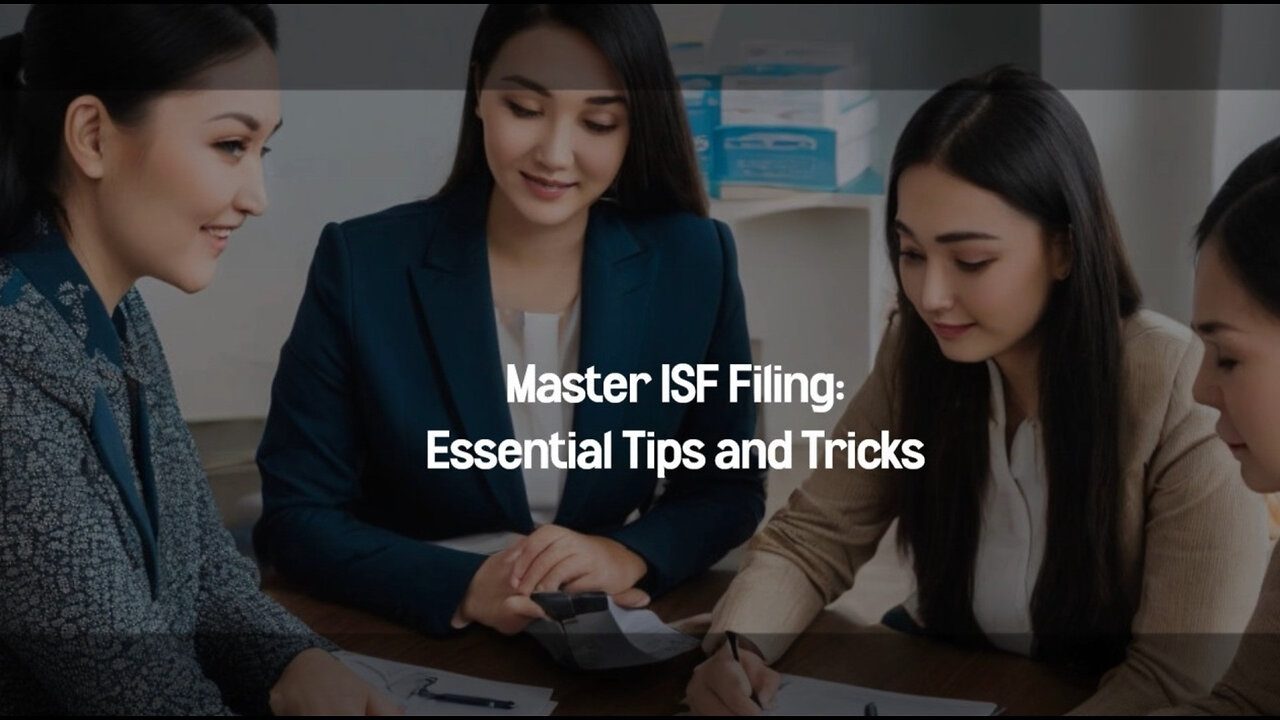Premium Only Content

Mastering ISF Filing: Best Practices for a Smooth Customs Process
License To Import // 323-578-6432 // [email protected] // www.licensetoimport.com
This video discusses best practices for Importer Security Filing (ISF) filing and recordkeeping in customs brokerage. Understanding the ISF filing requirements, establishing a reliable system for recordkeeping, maintaining accurate and up-to-date data, collaborating with supply chain partners, monitoring changes and updates in regulations, and seeking professional assistance are key points covered in this video.
The first best practice highlighted is to have a clear understanding of the requirements set by the US Customs and Border Protection (CBP) for ISF filing. This includes knowing the timeline for filing, the information to be provided, and any specific guidelines that apply to the shipment or commodity. Familiarizing oneself with these requirements can help avoid errors and penalties.
The second best practice emphasizes the importance of having a well-organized system for recordkeeping. It is crucial to keep all the necessary documentation readily accessible, such as commercial invoices, bills of lading, and packing lists. Electronic systems or software designed for customs brokerage can streamline the recordkeeping process and ensure easy retrieval of all documents.
Maintaining accurate and up-to-date data is crucial for successful ISF filing. Information about the manufacturer, shipper, consignee, and the goods being imported must be entered correctly to avoid delays and penalties. Regularly reviewing and updating data can help prevent any issues.
Effective communication and collaboration with supply chain partners, including freight forwarders, carriers, and customs brokers, is the fourth best practice. Strong relationships and timely information sharing are important for meeting ISF filing requirements.
The fifth best practice is to stay updated with changes and updates in regulations related to ISF filing. The CBP website and other reliable sources can provide the most recent information. Regularly reviewing any revisions in regulations will help maintain compliance and avoid issues.
Finally, if ISF filing seems overwhelming or if there are frequent import shipments, seeking the help of a licensed customs broker is recommended. These professionals are well-versed in customs regulations, ISF filing, and recordkeeping practices, and can ensure efficient and accurate ISF filings.
By following these best practices, importers can streamline the ISF filing process, reduce errors, and maintain compliance with CBP regulations. Staying informed and proactive is crucial in international trade.
#usimportbond #isfcustomsbroker #uscustomsclearing #isfentry
Video Disclaimer Here: This video is solely for education and is not endorsed by any US government agency.
00:29 - Understand the ISF Filing Requirements
00:56 - Establish a Reliable System for Recordkeeping
01:29 - Maintain Accurate and Up-to-Date Data
01:54 - Collaborate with Your Supply Chain Partners
02:17 - Monitor Changes and Updates in regulations
02:43 - Seek Professional Assistance
-
 1:40
1:40
License To Import
2 months agoHow To File ISF For Zentai / Catsuit
102 -
 3:23:28
3:23:28
GritsGG
4 hours agoRANK GRIND! Most Wins in WORLD! 3734+!
12K -
 LIVE
LIVE
I_Came_With_Fire_Podcast
13 hours agoChina Owning the Mississippi? | Letitia James Indicted, But Don't Get Excited | Insurrection Inbound
329 watching -
 LIVE
LIVE
Eternal_Spartan
12 hours ago🟢 Eternal Spartan Plays Battlefield 6! | USMC Vet
106 watching -
 LIVE
LIVE
This is the Ray Gaming
4 hours ago $0.64 earnedBattlefield 6 Launch Day Part 2 | Rumble Premium Creator
196 watching -
 58:29
58:29
NAG Podcast
6 hours agoChrissie Mayr: BOLDTALK W/Angela Belcamino
27.3K5 -

Jokeuhl Gaming and Chat
6 hours agoMEGABONK - Why am I still playing this?
4.84K -
 4:21:25
4:21:25
Fragniac
7 hours ago🔴 LIVE - FRAGNIAC - BATTLEFIELD 6 LAUNCH DAY w/ The BRRRAP Pack❗
5.61K -
 12:25:12
12:25:12
Dr Disrespect
16 hours ago🔴LIVE - DR DISRESPECT - BATTLEFIELD 6 - THE WAR BEGINS | BF6 LAUNCH DAY
186K17 -
 2:35:29
2:35:29
Bare Knuckle Fighting Championship
4 days agoBKFC ICE WARS 3: Laporte vs Lafferière
39.3K